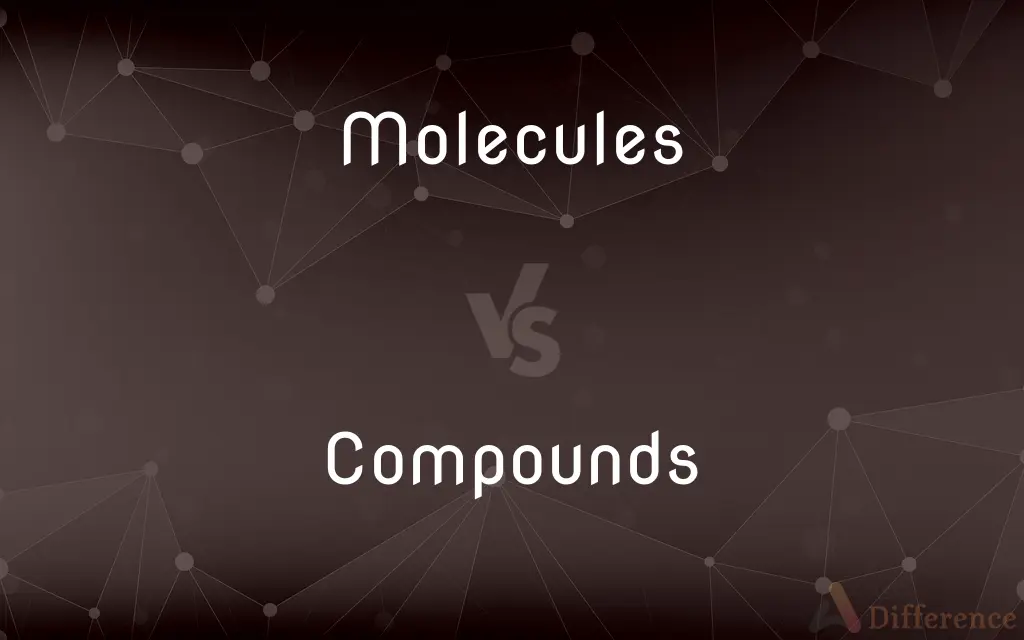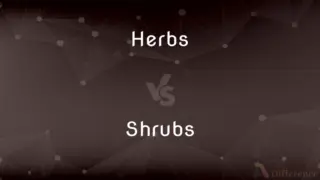Molecules vs. Compounds — What's the Difference?
By Tayyaba Rehman — Published on January 16, 2024
Molecules are two or more atoms bonded together; compounds are molecules with atoms of at least two different elements.

Difference Between Molecules and Compounds
Table of Contents
ADVERTISEMENT
Key Differences
A molecule is the smallest unit of a chemical element or compound that retains its chemical properties, consisting of one or more atoms bonded together. A compound, on the other hand, is a type of molecule that contains atoms of at least two different elements chemically bonded together. Both share the bond concept but differ in compositional complexity.
In chemistry, molecules form when atoms share electrons through covalent bonds. Compounds arise when these molecules consist of different elements, resulting in a substance with unique properties. Molecules can be as simple as diatomic oxygen (O2), while compounds, such as water (H2O), must contain different elements.
Molecules encompass a broad category of chemical species, including both compounds and elemental molecules. Compounds are a subset of molecules that specifically have atoms from different elements, like sodium chloride (NaCl). Thus, while all compounds are molecules, not all molecules are compounds.
The distinction between molecules and compounds is crucial when considering the properties of a substance. Molecules determine the substance's basic structure and properties, but compounds bring additional traits due to the interaction between the different elements within.
Understanding the molecular and compound nature of a substance is key in fields such as pharmacology and material science. While molecules provide the framework for understanding chemical reactions, compounds are particularly important when examining the formation of new substances with varied applications.
ADVERTISEMENT
Comparison Chart
Definition
A group of atoms bonded together.
A molecule consisting of atoms of different elements.
Composition
Can be the same element or different elements.
Must be composed of different elements.
Types
Include diatomic and polyatomic species.
Include ionic, covalent, and metallic compounds.
Example
O2 (oxygen) is a molecule of the same element.
H2O (water) is a compound of different elements.
Diversity
Can exist as elements or compounds.
Only exist as combinations of different elements.
Compare with Definitions
Molecules
Molecules are the smallest identifiable unit into which a pure substance can be divided without losing its composition.
A carbon dioxide molecule consists of one carbon and two oxygen atoms.
Compounds
A compound is a substance with atoms of two or more different elements bonded together.
Table salt is a compound formed from sodium and chlorine.
Molecules
A molecule is a stable group of atoms bonded together.
A molecule of water contains two hydrogen atoms and one oxygen atom.
Compounds
Compounds are formed from molecules by chemical reactions.
Water is a compound produced by the reaction of hydrogen and oxygen.
Molecules
Molecules are the chemical building blocks of compounds.
Glucose molecules fuel the cells of living organisms.
Compounds
Compounds have properties different from their constituent elements.
Ammonia is a compound that behaves differently than its nitrogen and hydrogen elements.
Molecules
In physics, a molecule is an electrically neutral entity consisting of more than one atom (n > 1).
An oxygen molecule is made up of two oxygen atoms.
Compounds
Chemical bonds in compounds can be ionic or covalent.
Sulfuric acid is a compound with covalent bonds between sulfur and oxygen.
Molecules
A molecule can be homonuclear (same atom type) or heteronuclear (different atom types).
A nitrogen molecule is homonuclear, comprising two nitrogen atoms.
Compounds
To combine so as to form a whole; mix
Tin was often compounded with lead to make pewter.
Molecules
The smallest particle of a substance that retains the chemical and physical properties of the substance and is composed of two or more atoms; a group of like or different atoms held together by chemical forces.
Compounds
To produce or create by combining two or more ingredients or parts; compose or make up
Pharmacists compounding prescriptions.
Molecules
A small particle; a tiny bit.
Compounds
To settle (a debt, for example) by agreeing on an amount less than the claim; adjust.
Molecules
Plural of molecule
Compounds
To compute (interest) on the principal and accrued interest.
Compounds
To add to or intensify so as to make worse
"The university authorities ... compounded their crime in dismissing [the professor] by denying that their action ... reflected any abridgment of academic freedom" (John Kenneth Galbraith).
Compounds
To make worse by being an additional or intensifying factor
High winds compounded the difficulties of the firefighters.
Compounds
To combine in or form a compound.
Compounds
To come to terms; agree.
Compounds
Consisting of two or more substances, ingredients, elements, or parts.
Compounds
(Botany) Composed of more than one part
A compound pistil.
Compounds
A combination of two or more elements or parts.
Compounds
(Linguistics) A word that consists either of two or more elements that are independent words, such as loudspeaker, self-portrait, or high school, or of specially modified combining forms of words, such as Greek philosophia, from philo-, "loving," and sophia, "wisdom."
Compounds
(Chemistry) A pure, macroscopically homogeneous substance consisting of atoms or ions of two or more different elements in definite proportions that cannot be separated by physical means. A compound usually has properties unlike those of its constituent elements.
Compounds
A building or buildings, especially a residence or group of residences, set off and enclosed by a barrier.
Compounds
An enclosed area used for confining prisoners of war.
Compounds
Plural of compound
Compounds
Infl of compound
Compounds
Each compound has a unique and fixed composition of elements.
Carbon dioxide is a compound that always contains carbon and oxygen in a 1:2 ratio.
Common Curiosities
What is an example of a simple molecule?
Oxygen (O2) is a simple molecule made up of two oxygen atoms.
What is a molecule?
A molecule is two or more atoms joined by chemical bonds.
Are all compounds molecules?
Yes, all compounds are molecules but not all molecules are compounds.
What defines a compound?
A compound is a molecule containing at least two different types of atoms.
Do molecules always have a fixed ratio of atoms?
Yes, molecules have a specific and fixed ratio of atoms.
Give an example of a compound.
Sodium chloride (NaCl), commonly known as table salt, is a compound.
Can molecules exist as liquids or gases?
solid, liquid, or gas.
Can the structure of a molecule be changed?
Yes, the structure of a molecule can change through chemical reactions.
How are molecules relevant to biology?
Molecules, like DNA, are essential for the structure and function of living organisms.
Do compounds have a fixed composition?
Compounds have a fixed composition; the ratio of their atoms is constant.
Why are compounds important in chemistry?
Compounds are crucial in chemistry for studying substance interactions and reactions.
Can a molecule be a single element?
Yes, molecules like O2 and N2 are composed of a single element.
Are compounds created or do they occur naturally?
Compounds can both be synthetically created and found in nature.
What changes when elements form a compound?
When elements form a compound, their physical and chemical properties change.
Can compounds be broken down into simpler substances?
Compounds can be broken down into simpler substances through chemical reactions.
Share Your Discovery

Previous Comparison
Herbs vs. Shrubs
Next Comparison
Imax 2D vs. Digital CinemaAuthor Spotlight
Written by
Tayyaba RehmanTayyaba Rehman is a distinguished writer, currently serving as a primary contributor to askdifference.com. As a researcher in semantics and etymology, Tayyaba's passion for the complexity of languages and their distinctions has found a perfect home on the platform. Tayyaba delves into the intricacies of language, distinguishing between commonly confused words and phrases, thereby providing clarity for readers worldwide.
















































